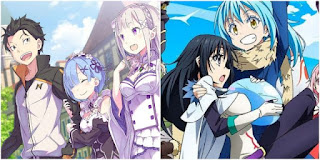Isekai, the genre of anime and manga where characters are transported to, reborn, or trapped in a different world, has exploded in popularity over the past decade. Popular animes like Digimon, Moonlit Fantasy, and Failure Frame. While the concept offers vast creative potential—allowing for diverse world-building, unique magic systems, and character development—the genre has also become synonymous with a particular narrative crutch: the overpowered (OP) protagonist.
At first glance, the allure of an overpowered hero in an isekai setting is easy to understand. Who wouldn’t want to escape the mundanity of the real world for a life where you’re instantly stronger, smarter, and more capable than everyone around you? The thrill of seeing an ordinary character suddenly wield god-like abilities and effortlessly overcome challenges can be immensely satisfying. However, as this trope becomes increasingly prevalent, it’s starting to wear thin, turning what was once a compelling fantasy into a repetitive and uninspired narrative device.
The Appeal of the OP Protagonist
To understand why the overpowered isekai trope became so popular, we need to consider its roots in wish fulfillment. Many isekai stories begin with a protagonist who, in their original world, is either unremarkable, downtrodden, or struggling with some personal issue. Upon being transported to a new world, they’re often granted immense power, typically in the form of magic, combat prowess, or a unique skill set that makes them virtually unbeatable.
This transformation taps into a deep-seated desire for empowerment. It’s a fantasy that resonates with many viewers, especially those who may feel powerless or overlooked in their own lives. The OP protagonist doesn’t just survive in the new world—they thrive, conquering all obstacles with ease. For a while, this formula worked brilliantly. Shows like Sword Art Online and No Game No Life captivated audiences with their larger-than-life heroes who could bend the rules of their respective worlds to their will.
The Narrative Dangers of Overpowered Protagonists
However, as the trope has become more widespread, it’s led to a glut of isekai series that rely on the same basic premise: an invincible protagonist who faces no real threats or challenges. While the power fantasy remains intact, the narrative depth often suffers as a result.
One of the biggest issues with overpowered protagonists is that they can make the story predictable and boring. If the hero can solve every problem with a flick of their wrist or a single well-placed punch, where’s the tension? Where’s the drama? Conflict is the engine that drives a story forward, but when the protagonist is too powerful, conflict becomes meaningless. The stakes are non-existent, and the plot becomes a series of increasingly outlandish scenarios designed solely to showcase the hero’s abilities, rather than explore the world or develop the characters.
Moreover, OP protagonists can stifle character development. In many of these series, the hero’s journey is less about growth and more about spectacle. There’s little room for the protagonist to learn, adapt, or struggle in a meaningful way. They start off powerful and remain powerful, with few, if any, moments of vulnerability. This lack of development can make the character feel flat and one-dimensional, reducing them to little more than a vessel for the audience’s power fantasies.
The Diminishing Returns of Power Fantasy
As more and more isekai series adopt the overpowered protagonist trope, the novelty has started to wear off. What was once a fresh and exciting concept has become overused, leading to a sense of fatigue among viewers. Audiences are beginning to crave more nuanced stories—ones where the protagonist isn’t an all-powerful deity, but rather a flawed, relatable character who grows and changes over time.
In response to this growing fatigue, some isekai series have begun to subvert or challenge the OP trope. Shows like Re:Zero and That Time I Got Reincarnated as a Slime introduce protagonists who, while powerful, also face significant challenges and consequences. These series remind us that strength alone doesn’t make a character interesting; it’s how they use that strength, and how they confront the world around them, that truly matters.
The Future of Isekai
The overpowered isekai trope is becoming inherently bad. its overuse has led to a saturation of the genre with stories that lack depth and originality. To keep isekai fresh and engaging, creators need to move beyond the simple power fantasy and explore the full potential of the genre—by crafting complex characters, building intricate worlds, and, most importantly, by allowing their protagonists to struggle, grow, and occasionally fail, like Grimgar of Fantasy and Ash.
As the isekai genre continues to evolve, there’s hope that we’ll see a shift away from the overpowered protagonist trope and towards more balanced, character-driven narratives. After all, the best stories aren’t just about watching a hero win—they’re about watching them learn, adapt, and ultimately, become someone greater than they were before.







No comments:
Post a Comment